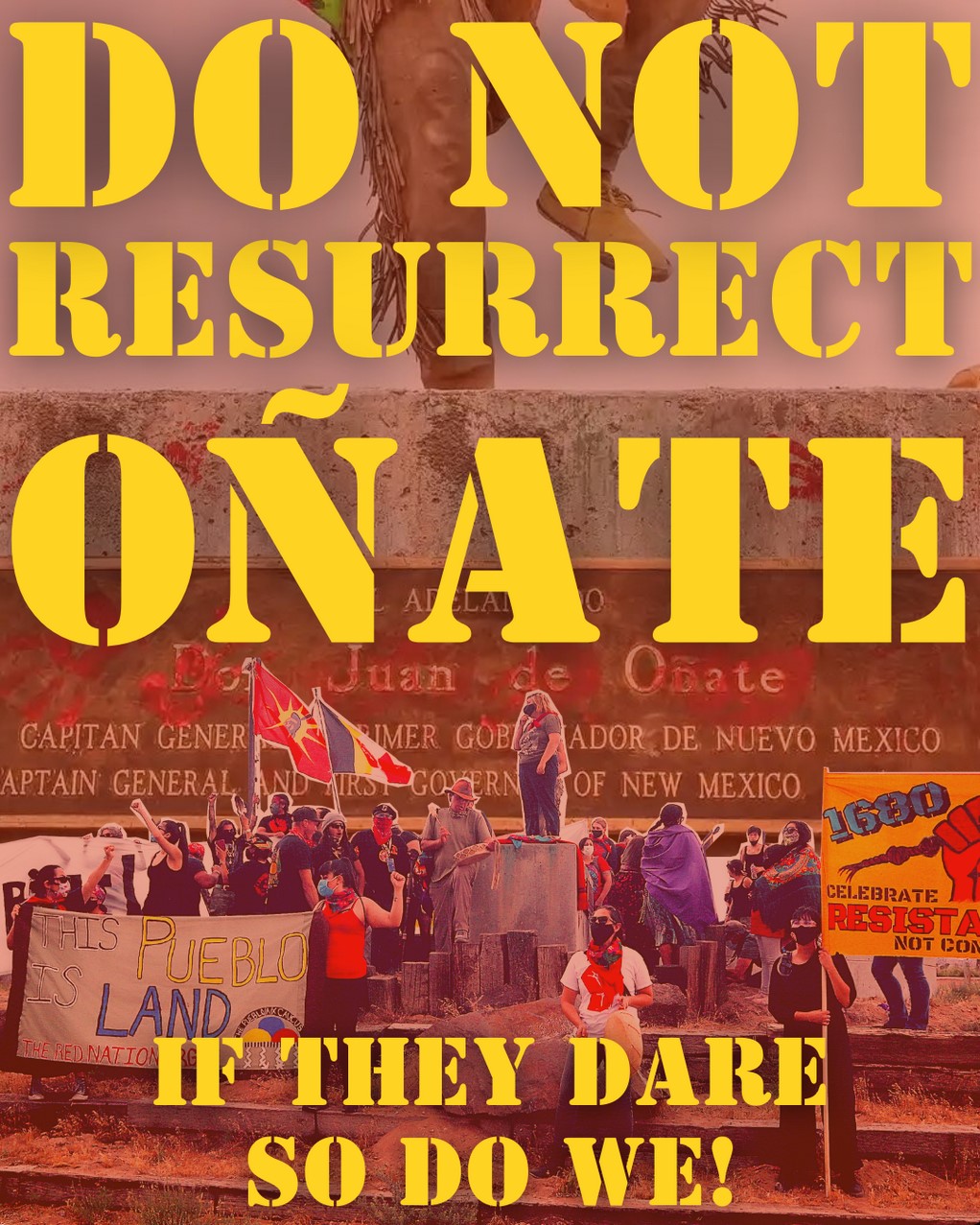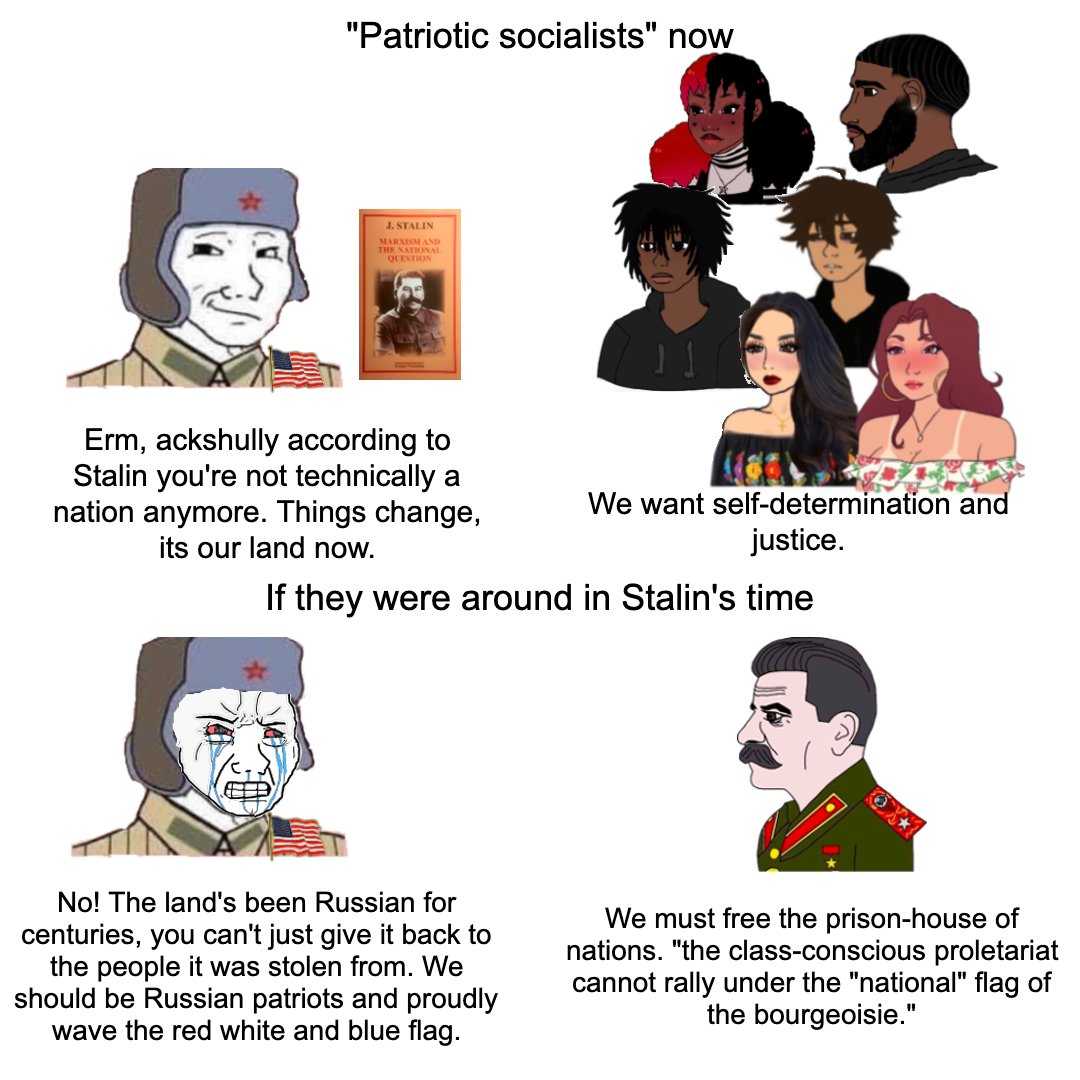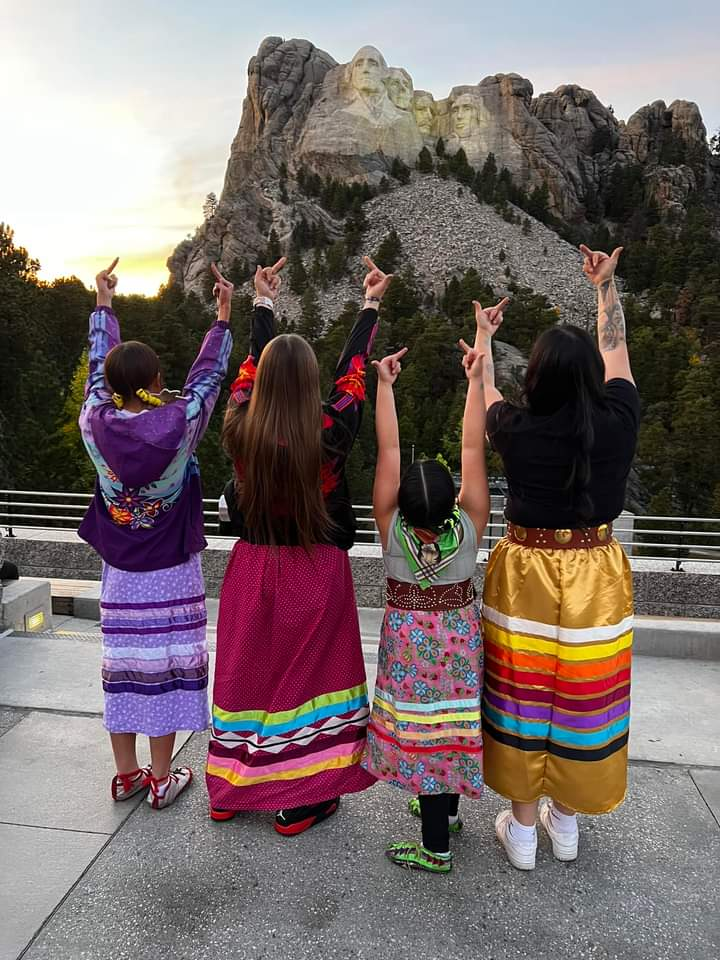cross-posted from: https://lemmygrad.ml/post/516254
Over the last several years I have, in song with others, pushed for priorities to be directed toward a “socialism with American characteristics.” The discourse that the quest has generated has often been a disaster. The obvious worst of this being the “patsoc” thinking that has thankfully quieted for the most part. In order to better advance this cause of creating a revolutionary theory, and to combat my personal angst which arises in the face of Maoists trying to force me to read about the Philippines instead of something that could be even more relevant for North America, I believe it would be generative to show an example of how Marxist theory has been used by Dene scholar Glen Sean Coulthard.
Not entirely unlike how Mao and the communists of China facilitated a “sinophication” of Marxism, some scholars and activists are arguably indigenizing Marxism, or making it “transformed in conversation with critical thought and practices of Indigenous peoples” to make it compatible for North American realities (p. 9).
In his book, Red Skin, White Masks, Coulthard explores the subjectivity that is enforced on Indigenous people by colonialism and the complications that arise. Coulthard may not be an explicit Marxist, he probably does not go around claiming to be ML, his aim is more to mold Marxism into a weapon for Indigenous people and not the other way around. Personally, I find this to be a worthy cause that more should be aware of.
I can’t do justice to a full summary at this time, but to partially summarize the book I will focus primarily on the context shift toward colonialism that Coulthard uses alongside his views on primitive accumulation. Most of this will be from just the introduction. I’ve chosen this because I believe this text provides a bridge between Indigenous thinkers and Marxist thinkers and can be a kind of gateway for a complex topic. Hopefully, this can expose comrades here to Indigenous thinking that can help us understand what is to be done.
Subheading: Into the Weeds
This context shift is a move toward a context of colonial instead of just capital relations by way of primitive accumulation. He defines colonialism as structured dispossession and utilizes chapters 26-32 of Capital vol I to stand on this.
He writes (p.7): In Capital these formative acts of violent dispossession set the stage for the emergence of capitalist accumulation and the reproduction of capitalist relations of production by tearing Indigenous societies, peasants and other small-scale, self-sufficient agricultural producers from the source of their livelihood—the land.
Many are already familiar with Primitive Accumulation, but I will attempt to flesh it out regardless. Primitive accumulation often seen as a temporary state of brutality were it forcefully opens up “what were once collectively held territories and resources to privatization” which inevitably leads to proletarianization. It is this violent transformation of non-capitalist relations into capitalist, market relations that constitutes primitive accumulation. Before continuing on to how Coulthard would like to recontextualize primitive accumulation he briefly touches on the fact that Indigenous thinking and Marxist thinking are oftentimes at odds. Part of his goal is to rescue both Indigenous people from the oftentimes racist, chauvinist, reactionary attitudes that Marxists often deploy and rescue Marxism from a “premature rejection” by Indigenous thinkers (p. 8). By doing so (he holds that feminist, queer, anarchist, and post-colonial thinking will be helpful) he believes more light can be shed on colonial domination and resistance.
Transforming Primitive Accumulation
In order to transform Marx’s primitive accumulation, he addresses three problematic features, and several important insights about these features. Some of these criticisms you may already be familiar with.
The first feature is “Marx’s rigidly temporal framing of the phenomenon” (p9). The idea here is that PA (primitive accumulation) is confined to a specific phase in time. For example, in England PA has passed and completed but in the colonies PA is present. Along with many other Marxian thinkers (like Harvey et al), a persistent role of PA is what we should see, and certainly with neoliberal hegemony. “[U]nconcealed, violent dispossession continues to play in the reproduction of colonial and capitalist social relations in both the domestic and global contexts” (p9).
The second feature is normative developmentalism. This is basically what was especially present in early Marx, a modernist view of history. This leads some of Marx’s work to portray PA as a historical inevitability that is apart of a historical metanarrative. Coulthard seeks to rescue Marx from this fallacy by shifting emphasis from capital relations to colonial relations.
Marx sees PA as a process of dispossession that leads to proletarianization. His concern was with understanding capital as a social relation dependent on the separation of workers from the means of production. Thus Marx was not nearly as preoccupied with dispossession as he was with arriving at proletarianization as a focus (p11).
He writes (p11): By repositioning the colonial frame as our overarching lens of analysis it becomes far more difficult to justify in antiquated developmental terms (from either the right or left) the assimilation of non-capitalist, non-Western, Indigenous modes of life based on the racist assumption that this assimilation will somehow magically redeem itself by bringing the fruits of capitalist modernity into the supposedly ‘backward’ world of the colonized.
This is something late Marx was more comfortable with. However, his point is well taken. I personally have seen “patsocs” of the last few years attempt to say what happened to Indigenous people was merely them being added to the work force. Proletarianization, but ignoring the colonial relations in order to assert this was a natural and inevitable event, even a desirable one. Also, I find that within the academy, Marx is often taught as a snapshot of his early self, so this criticism is good for those who have been confined to early Marx (Tangentially I think the academy misrepresents Marx’s totality regularly so its good to have criticisms that are not based in liberal chauvinisms.) It is evident that “egalitarian” voices will use modernist fallacies to reproduce dispossession. For example, advocates who seek a return of the commons fail to understand that there are no “commons” in Canada or the US. There is only the land of the First Peoples.
He writes (pg12) By ignoring or downplaying the injustice of colonial dispossession, critical theory and left political strategy not only risks becoming complicit in the very structures and processes of domination that it out to oppose, but it also risks overlooking what could probe to be invaluable glimpses into the ethical practices and preconditions required for the construction of a more just and sustainable world order.
Further insight into this critique regards the role of Indigenous labor. As industrial capitalism matured in North America, Indigenous labor was rendered increasingly (though not entirely) superfluous. This helps us furthure understand why the context of colonial relations and the emphasis on dispossession can illuminate more than the normative developmentalist views that prioritize proletarianization can.
Forgive my metaphor, but in many ways the civilization policies that were levied against Indigenous peoples were the John the Baptist that preceded the Christ of industrialism. This is seen in how slavery was spread through Henry Knox’s civilization policy, something I’d be happy to post about separately another time. As Canada’s commissioner of Indian Affairs wrote in 1890, “The work of sub-dividing reserves has begun in earnest. The policy of destroying the tribal or communist system is assailed in every possible way and every effort has been made to implant a spirit of individual responsibility instead.”
(Note the red scare language. This is something that is present throughout the history of Indigenous resistance to colonialism.)
However, you could point to proletarianization as a distraction, usually it is said dispossession was meant to facilitate proletarianization, but for Indigenous people dispossession was meant to acquire land and resources for capital. Dispossession is the “dominant background structure” and “continues to inform the dominant modes of Indigenous resistance (p13).”
He writes further: (p13) The theory and practice of Indigenous anticolonialism, including Indigenous anticapitalism, is best understood as a struggle primarily inspired by and oriented around the question of land—a struggle not only for land in the material sense, but also deeply informed by what the land as a system of reciprocal relations and obligations can teach us about living our lives in relation to one another and the natural world in nondomination and nonexploitative terms—and less around our emergent status as ‘rightless proletarians.”
Grounded normativity cannot be stressed enough as a key for understanding pan-Indigenous philosophies and how they can interact with Marxism. For Indigenous philosophers, ethics cannot be simply separated from cosmology, or from anything, certainly not from land. The universe itself has a moral character that is revealed by co-relationality. I would recommend works by Vine Deloria Jr and Richard Atleo to have a better feel for how this works although Coulthard himself gives good insights himself later in the book.
For now, grounded normativity can by defined as “the modalities of Indigenous land-connected practices and longstanding experiential knowledge that inform and structure our ethical engagements with the world and our relationships with human and nonhuman others over time” (p13). I will focus on this more in later posts if I can.
Another insight into normative developmentalism that is briefly mentioned, is that it doesn’t always see the land itself as exploitable, people are. There is a tendency to deploy poor understandings of the environment and a presumption that Marxism is designed to ignore ecocriticism. I did not go into detail about grounded normativity, but we can already see that if we see Land as a system of relations then this anti-environmental tendency is problematic for Indigenous thinking in unique ways even when it is routinely levied by ecological thinkers. A final insight into normative developmentalism is economic reductionism. I’ll let quotes take this one as other authors tackle this regularly and I’d rather his voice shine for this article.
He writes: (pg 14-15) …the colonial relation should not be understood as a primary locus or base from which these other forms of oppression flow, but rather as the inherited background field within which market, racist, patriarchal, and stat relations converge to facilitate a certain power effect—in our case, the reproduction of hierarchical social relations that facilitate the dispossession of our lands and self-determining capacities. Like capital, colonialism, as a structure of domination predicated on dispossession, is not ‘a thing,’ but rather the sum effect of the diversity of inter locking oppressive social relations that constitute it.” Basically, shifting toward colonial relations doesn’t “displace” class struggle, but “situates these questions more firmly alongside and in relation to the other sites and relations of power that inform our settler-colonial present.”
OK so now on to the 3rd and final problematic feature. Which is more of a question on governmentality. This one is interesting because I think his peers have pushed against this. Basically, he believes that because the liberal Canadian state is developing less overtly brutal methods of subjugation it differs from the explicitly and incredible violence that Marx asserts goes hand in hand with primitive accumulation—as Marx says, “dripping from head to toe, from every pore, in blood and dirt.”
He asks readers: (p15) What are we to make of contexts where state violence no longer constitutes the regulative norm governing the process of colonial dispossession, as appears to be the case in ostensibly tolerant, multinational, liberal settler polities such as Canada? Stated in Marx’s own terms, if neither ‘blood and fire’ nor the ‘silent compulsion’ of capitalist economics can adequately account for the reproduction of colonial hierarchies in liberal democratic contexts, what can?
I take this as more of a question of understanding what the state is up to than a statement that violence has lost its place in primitive accumulation. Much of the book is about “recognition” and how relying on state recognition is bunk, so in that light, it makes sense to me to ask these questions in hopes of understanding the role that pursuing state recognition plays in primitive accumulation. But clearly violence is still the status quo for Indigenous people, thus I find this to be his weakest but most intriguing point.
Conclusion
So, I have laid out Coulthard’s initial points on primitive accumulation. In the future I hope to make a post on more parts of this book, and maybe others as well. I especially intend to flesh out grounded normativity and recognition, which the book is mostly about in the first place as I think these can be helpful concepts for comrades.



